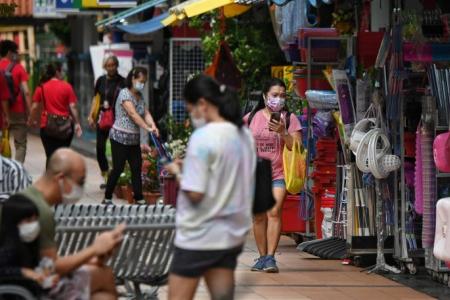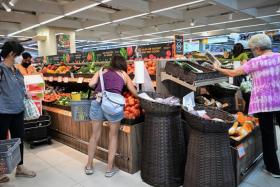WP MPs call for more diverse household examples in Budget, 'just transition' for petrochem sector
The Budget statement contains illustrations that reinforce gender stereotypes and fail to reflect the diversity of households here, such as those that include adult singles, said Workers' Party (WP) chairman Sylvia Lim (Aljunied GRC) in Parliament on Tuesday (March 1).
Speaking on the second day of the debate on Budget 2022, Ms Lim added that the four households illustrated in the annex of the statement all comprise of married couples living in Housing Board flats, mostly with children.
"If the couple is of working age, the husband is always older and always earns more than the wife. There is a further assumption that all household members are Singapore citizens," she observed.
She said the illustrations may inadvertently alienate Singaporeans whose households do not fit this traditional structure, and reinforce the stereotype of the man being the main breadwinner.
The typical households in the illustrations may also experience less severe impacts from the planned goods and services tax increase than other types of households due to more offsets, she added.
Ms Lim asked if the Ministry of Finance could include a broader range of illustrations in future to capture other types of households that are "not uncommon", such as divorced families, families with a foreign spouse and adult singles living with elderly parents.
There is also no need for the illustrations to specify amounts earned by husbands and wives separately, Ms Lim said, as an indication of their combined household income would suffice.
"By including some other types of households, we can have a fuller picture of the impact of tax changes on different segments of society.
"More importantly, I believe including them would have an important signalling effect that every household, whatever its composition, is part and parcel of the Singapore compact."
In her speech, Ms Lim also said there is more scope for Singapore to expand its capacity for innovation.
While there have been recent reassuring developments such as moves by vaccine manufacturers BioNTech and Hilleman Laboratories to set up manufacturing facilities here, Singapore should strive to "move up the value chain" and own such intellectual property, she said.
Ms Lim also noted that South Korea overtook Singapore in the latest Global Innovation Index published annually by the World Intellectual Property Office.
South Korea rose to fifth place last year, up from the 10th spot in 2020, while Singapore stayed at eighth place.
Singapore should do some introspection on why it seems to be lagging behind in creative, knowledge and technology outputs, said Ms Lim.
WP vice-chairman Faisal Manap (Aljunied GRC) spoke about the plight of various marginalised groups whose needs are not addressed in the Budget.
Noting that certificate of entitlement prices for motorcycles recently crossed the $10,000 mark, he asked for more help for households that depend on the use of motorcycles to earn their living.
He asked for reforms to immigration policies to make it easier for foreign spouses of Singaporeans to obtain citizenship, permanent residency and education subsidies for their children.
Mr Faisal also asked for various other reforms to help single unwed parents, stateless individuals and low-income Malay/Muslim residents of rental flats.
He also said Edusave Awards should be extended to full-time madrasah students to show Singapore's inclusivity, while more effort should be made to expand Malay language education for Malay children.
Mr Dennis Tan (Hougang) of the WP asked for more details on planned changes to the carbon tax and other sustainability measures, including how Singapore intends to manage the the green transition for the petrochemical industry.
He called for a "just transition" as Singapore pivots to greener energy sources and cautioned that any growing resistance towards the oil and gas industry could disrupt the talent pipeline in what is still a "strategic pillar" of the country's industrial sector.
Mr Tan also wanted to know more about the Government's plans for expanding electric vehicle charging points, including ways to minimise waiting times and avoid traffic blockage from vehicles waiting for charging lots.
He also raised concerns about the potential impact of the impending GST hike on healthcare costs.
While subsidised patients in public hospitals and polyclinics do not pay GST, Mr Tan noted that patients at private clinics and non-structured hospitals have to.
GST is also levied on premiums of shield and group medical insurance plans, he added.
On this note, Mr Tan asked if the Government can assure Singaporeans that the hike in GST will not result in higher out-of-pocket healthcare costs.
Get The New Paper on your phone with the free TNP app. Download from the Apple App Store or Google Play Store now


